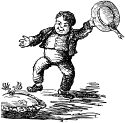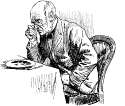Search us!
Search The Word Detective and our family of websites:
This is the easiest way to find a column on a particular word or phrase.
To search for a specific phrase, put it between quotation marks. (note: JavaScript must be turned on in your browser to view results.)
Ask a Question! Puzzled by Posh?
Confounded by Cattycorner?
Baffled by Balderdash?
Flummoxed by Flabbergast?
Perplexed by Pandemonium?
Nonplussed by... Nonplussed?
Annoyed by Alliteration?

Don't be shy!
Send in your question!
Columns from 1995 to 2006 are slowly being added to the above archives. For the moment, they can best be found by using the Search box at the top of this column.
 If you would like to be notified when each monthly update is posted here, sign up for our free email notification list.
If you would like to be notified when each monthly update is posted here, sign up for our free email notification list.
Trivia
All contents herein (except the illustrations, which are in the public domain) are Copyright © 1995-2020 Evan Morris & Kathy Wollard. Reproduction without written permission is prohibited, with the exception that teachers in public schools may duplicate and distribute the material here for classroom use.
Any typos found are yours to keep.
And remember, kids,
Semper Ubi Sub Ubi
|
Waddya mean there’s no merit badge for watching Mister Ed?
Dear Word Detective: I have a friend involved with the Wood Badge program in Boy Scouts, and a popular phrase they use is “Working my Ticket,” by which they mean earning the Badge. The question is, what is the actual meaning of the original use of this term? The term came to the US branch of Boy Scouts through the song “Back to Gilwell,” which Lord Baden Powell included in his early adult training program. Supposedly, BP got the song (and phrase) from the British Army, and that the term refers to an era when British soldiers serving overseas had to earn their own fare back to England upon discharge. In their interpretation, “Working my Ticket” connotes hard work towards a worthy goal. However, every time I’ve seen the term, it is a euphemism for goofing off, seeking a fraudulent discharge or even living off welfare/charity. In fact, I recently saw it defined in a military slang dictionary as “being a slacker.” I suspect the original meaning of this British Army term has been lost and reinvented in a more worthy form. What was its original meaning? — Chuck Herrick.
 Thanks for an interesting question. It takes me back to my halcyon days in the Cub Scouts, which, as I recall, totaled about five. As soon as I realized that they were serious about that “sleeping outdoors” stuff, I was history. Thanks for an interesting question. It takes me back to my halcyon days in the Cub Scouts, which, as I recall, totaled about five. As soon as I realized that they were serious about that “sleeping outdoors” stuff, I was history.
I looked up the lyrics to “Back to Gilwell,” which begin:
I used to be a Beaver, And a good old Beaver too, But now I’ve finished Beavering, I don’t know what to do, I’m growing old and feeble, And I can Beaver no more, So I’m going to work my ticket if I can. (chorus) Back to Gilwell, happy land, I’m going to work my ticket if I can.
Gilwell Park, outside London, is where Sir Robert Baden-Powell, founder of the international Scouting movement, established the first scoutmaster’s training camp in 1919, and apparently the place is infested with beavers. Just kidding; as the song proceeds, it cycles through various Scout patrol names (Eagle, Fox, Owl, etc.).
Baden-Powell was a retired General of the British Army, so he certainly had encountered armed services slang, but I’m beginning to wonder how well he understood what he heard. “Working one’s ticket” was, as of the late 1890s, British Army slang for “obtaining one’s discharge papers by claiming (or feigning) a physical disability” (“It is a comparatively easy matter for a discontented man to ‘work his ticket’,” H. Wyndham, The Queen’s Service, 1899). “To get one’s ticket” was to be discharged in the normal way, the “ticket” being a certificate of discharge, not a ticket home. “To work one’s ticket” is apparently still current slang in Britain for “to gain an advantage by malingering or fraud.”
So, was “Back to Gilwell” an attempt to redefine “work one’s ticket” in a positive direction? Or has the song been misinterpreted, and the Old Scout actually angling for a chance to goof off back at base camp? Beats me, but to most folks outside of scouting, “to work one’s ticket” is the polar opposite of hard work. If the Scouts manage to change that meaning in popular use, they deserve a Usage Badge with an oak cluster.
“How are you?” is another real puzzler.
Dear Word Detective: I’m a wembler. I wemble. I’m wembley. I use the word occasionally to describe myself. I can’t always make a firm decision. My husband insists that this word “wemble” came from a Fraggle Rock character who was very indecisive. I thought that the character was named, as such, for the word. I don’t remember where I first heard it, so I just thought it was a regular word. But there’s no mention of it in the dictionary. Where did this term come from? — Allison Oceguera.
 Ah, the old executive function deficit, eh? A ditherer, in other words. Me too. A few months ago we were in a restaurant, ordering lunch, and the server asked whether I wanted cheese on my sandwich. Even though I really didn’t care, apparently it doesn’t work to answer “It doesn’t matter” in such situations. Of such moments family legends are born. Ah, the old executive function deficit, eh? A ditherer, in other words. Me too. A few months ago we were in a restaurant, ordering lunch, and the server asked whether I wanted cheese on my sandwich. Even though I really didn’t care, apparently it doesn’t work to answer “It doesn’t matter” in such situations. Of such moments family legends are born.
I was only vaguely aware of “Fraggle Rock” when it was on (1983-87), but evidently it was a children’s series featuring puppets created by Jim Henson which, according to Wikipedia, entertained the kiddies while “seriously exploring complex issues of prejudice, spirituality, personal identity, environment, and social conflict.” O-kay. In any case, there was indeed a character named Wembley Fraggle in the series who was “nervous and pathologically indecisive.” So your husband is not insane (always good to know), and if you watched the show as a tot you may have picked up “wembley” there as well.
Jim Henson did not, however, invent the word. “Wembley” appears to be a variant of the English dialect word “wambly,” meaning “shaky, tottering or unsteady.” “Wambly,” in turn, is derived from the very old (14th century) English verb “to wamble,” originally meaning “to feel nausea” in a literal sense, but also “to totter, to walk unsteadily.” Although the Oxford English Dictionary (OED) doesn’t directly address the question, eventually “wamble” was apparently used in a figurative sense to mean “to be unsteady of mind or will,” i.e.,”to be indecisive, inconsistent.”
The origin of “wamble” and its descendants is a bit unclear. The OED suggests that “two or more verbs have coalesced” to form “wamble,” specifically a root corresponding to the Danish word “vamle” (to feel nausea) and, in the senses denoting unsteady gait, an ancestor of the Norwegian “vamla,” meaning “to stagger.” Spellings are also highly variable, as of the 19th century including the variants “wammel,” “wemble” and “wommle.” Perhaps such fuzziness is appropriate in a word meaning “indecisive.”
“Wembley,” incidentally, is unrelated to the Wembley section of London (and the famed football stadium located therein), which takes its name from an old English proper name, Wemba, and the Old English word “lea,” meaning “meadow.” It is possible, however, that Henson, who had no doubt heard of Wembley Stadium, based the spelling of Wembley Fraggle’s name on that of the stadium.
No visible means of support.
Dear Word Detective: What’s the origin of the phrase “trumped up,” used to describe false and/or frivolous accusations of a crime or impropriety, as in “trumped up charges”? — Allan Pratt.
 Hmm. You’re all expecting me to lead off with an energetic swipe at The Donald and his Remarkable Do, aren’t you? Well, I’m not going down that path. This is a dignified, scholarly column. Besides, nothing I could possibly come up with could match the brilliance of the appellation the late and lamented Spy magazine routinely applied to El Trump, “Short-fingered vulgarian.” On the other hand, “Paris Hilton with bulldozers” has a nice ring to it. Hmm. You’re all expecting me to lead off with an energetic swipe at The Donald and his Remarkable Do, aren’t you? Well, I’m not going down that path. This is a dignified, scholarly column. Besides, nothing I could possibly come up with could match the brilliance of the appellation the late and lamented Spy magazine routinely applied to El Trump, “Short-fingered vulgarian.” On the other hand, “Paris Hilton with bulldozers” has a nice ring to it.
Onward. There are two main senses of “trump” as both a noun and a verb in English. The older verb “to trump,” first appearing in the 14th century, means simply “to blow or sound a trumpet” (or, as we also say in fuller form, “to trumpet”). The “trumpet” itself takes its name from a Germanic root that was probably echoic, i.e., intended to imitate the actual sound of a trumpet. The Italian form, “tromba,” begat “trombone” (meaning literally “large trumpet”), which passed into English in the early 18th century, making high-school marching bands possible.
The other “trump” comes from card games, specifically the use of “trump” to mean a card which ranks above the others in play, i.e., a winning card. This “trump,” which first appeared in English in the 16th century, is simply a corruption of the word “triumph,” and the word seems to have been taken from a now-obsolete card game called “triumph” or (don’t ask me to explain this) “ruff.”
The “winning card” sense of “trump” spawned a range of figurative uses, including the verb “to trump” meaning “to beat” or “to frustrate by impeding” (“Bob found that his co-worker’s access to Yankees tickets trumped his own diligence in the eyes of his boss”). By the 17th century, “to trump” was being used to mean “to bring forward, to allege” with the sense of concocting an allegation in order to gain an advantage over an adversary. From there it was a short jump to “trump” meaning “to forge, fabricate or invent,” and the “trumped-up charge” was born.
While the evolution of “trump” in this sense sounds straightforward, there is a small loose end I must mention. There was a now-obsolete (last seen in the early 17th century) English verb “to trump” meaning “to deceive or cheat,” derived from the Old French “tromper” of the same meaning. Oddly enough, this word does not seem to have been derived from any form of “triumph,” but may actually be related to “trumpet” in some way.
|
Makes a great gift! Click cover for more.  
400+ pages of science questions answered and explained for kids -- and adults!
FROM ALTOIDS TO ZIMA, by Evan Morris
 
|
 Thanks for an interesting question. It takes me back to my halcyon days in the Cub Scouts, which, as I recall, totaled about five. As soon as I realized that they were serious about that “sleeping outdoors” stuff, I was history.
Thanks for an interesting question. It takes me back to my halcyon days in the Cub Scouts, which, as I recall, totaled about five. As soon as I realized that they were serious about that “sleeping outdoors” stuff, I was history.

 can be found
can be found 
 Ah, the old executive function deficit, eh? A ditherer, in other words. Me too. A few months ago we were in a restaurant, ordering lunch, and the server asked whether I wanted cheese on my sandwich. Even though I really didn’t care, apparently it doesn’t work to answer “It doesn’t matter” in such situations. Of such moments family legends are born.
Ah, the old executive function deficit, eh? A ditherer, in other words. Me too. A few months ago we were in a restaurant, ordering lunch, and the server asked whether I wanted cheese on my sandwich. Even though I really didn’t care, apparently it doesn’t work to answer “It doesn’t matter” in such situations. Of such moments family legends are born. Hmm. You’re all expecting me to lead off with an energetic swipe at The Donald and his Remarkable Do, aren’t you? Well, I’m not going down that path. This is a dignified, scholarly column. Besides, nothing I could possibly come up with could match the brilliance of the appellation the late and lamented Spy magazine routinely applied to El Trump, “Short-fingered vulgarian.” On the other hand, “Paris Hilton with bulldozers” has a nice ring to it.
Hmm. You’re all expecting me to lead off with an energetic swipe at The Donald and his Remarkable Do, aren’t you? Well, I’m not going down that path. This is a dignified, scholarly column. Besides, nothing I could possibly come up with could match the brilliance of the appellation the late and lamented Spy magazine routinely applied to El Trump, “Short-fingered vulgarian.” On the other hand, “Paris Hilton with bulldozers” has a nice ring to it.



Recent Comments